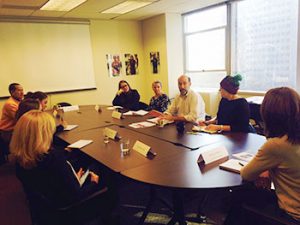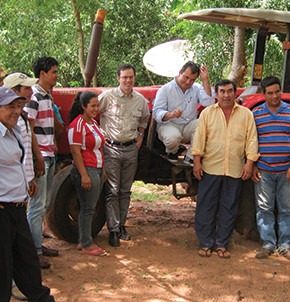Blog
Posted on November 17, 2014
By Alyssa Brooks, the Snow Leopard Trust, a Global Washington member
 On November 13, a group of executive and program directors gathered for Global Washington’s ED Roundtable to discuss a challenge that all NGO leaders face: fundraising. Brad Rutherford, Executive Director of the Snow Leopard Trust (SLT), led the lively discussion and talked about the success he’s had in his almost 15 years with the Trust.
On November 13, a group of executive and program directors gathered for Global Washington’s ED Roundtable to discuss a challenge that all NGO leaders face: fundraising. Brad Rutherford, Executive Director of the Snow Leopard Trust (SLT), led the lively discussion and talked about the success he’s had in his almost 15 years with the Trust.
“Executive Directors wear many hats,” stated Rutherford. “Fundraising is similar in that it’s never one size fits all.” Rutherford described SLT’s three main sources of fundraising – Snow Leopard Enterprises, donors and subscriptions, and annual events.
Continue Reading
Posted on November 11, 2014
by Mark Coffey, chief investment and operating officer, Global Partnerships, a Global Washington member

Mark Coffey (center) meets with a group of 75 Paraguayan farmers. These farmers have formed an association that sells to BioExport. They have also banded together to purchase the tractor pictured. They are hoping that their livelihoods will improve, and that they can one day become a cooperative. Photo © Global Partnerships.
Last week I traveled to Paraguay to meet with social enterprises, agricultural producers and a government official as part of our research into new investment opportunities. Nearly a quarter of Paraguay’s population lives below the poverty line, but the country’s underdeveloped economy is currently experiencing rapid economic growth. With this kind of growth comes the chance to catalyze and expand opportunity for people living in poverty. As I flew over much of the small, land-locked country in a tiny Beechcraft plane, I noticed the flatness of the land, its many rivers, and the countless tracts of well-watered but unused farmland. It is evident that Paraguay’s agricultural sector has tremendous potential for growth.
Social enterprises
During my five days in Paraguay I was able to visit four social enterprises:
- BioExport and ARASY, two agricultural organizations that provide technical assistance and access to (and processing for) export markets. They serve smallholder farmers growing sesame and chia as well as more traditional products like cotton and rice;
- Fundacion Paraguaya, which provides credit and integrated services to people living at the base of the economic pyramid; and
- Elevate Business, which provides business training to young, emerging small and micro entrepreneurs (SME’s) who have high potential to absorb and implement concepts for markedly improving their business. Some of their clients include Fundacion Paraguaya’s clients. In the past decade, many farmers with land holdings under 8 hectares (approximately 20 acres) have realized the benefit of enriching their soil and their incomes by converting from one traditional crop (such as rice, beans, corn, and cotton) to higher priced products such as sesame and chia. Thanks to the efforts of social enterprises such as BioExport and ARASY, hereafter referred to as “outgrowers,” there is a developing export market for these higher-priced products. To scale the opportunity to more farmers, we need to build up an ecosystem where access to financing, technical assistance and markets is readily available.
To read the full article, click here.
Posted on November 3, 2014
By Christine Pinho, Data Analyst at Big Water Consulting, a Global Washington member

We live in the age of data. It’s a well-used buzzword, a trending topic among a wide range of people from marketers and social media experts to business analysts and tech nerds. This is for good reason: data does help organizations manage themselves more efficiently and plan better.
Continue Reading
 On November 13, a group of executive and program directors gathered for Global Washington’s ED Roundtable to discuss a challenge that all NGO leaders face: fundraising. Brad Rutherford, Executive Director of the Snow Leopard Trust (SLT), led the lively discussion and talked about the success he’s had in his almost 15 years with the Trust.
On November 13, a group of executive and program directors gathered for Global Washington’s ED Roundtable to discuss a challenge that all NGO leaders face: fundraising. Brad Rutherford, Executive Director of the Snow Leopard Trust (SLT), led the lively discussion and talked about the success he’s had in his almost 15 years with the Trust.
